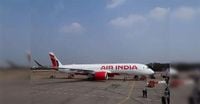In the wake of the tragic crash of Air India flight AI 171 on June 12, 2025, the aviation sector and the public continue to grapple with the aftermath of one of the deadliest air disasters in recent memory. The Boeing 787-8 aircraft, en route from Ahmedabad to London Gatwick, crashed into a building shortly after takeoff, resulting in the deaths of 260 people—241 passengers onboard and 19 individuals on the ground. Remarkably, one passenger survived the catastrophe, a rare glimmer of hope amid overwhelming loss.
On July 24, 2025, Minister of State for Civil Aviation Murlidhar Mohol addressed a Lok Sabha query regarding the health and wellbeing of Air India's flight crew in the incident's aftermath. He revealed a "minor increase" in sick leave reports by pilots, with a notable spike on June 16, just days after the crash, when 112 pilots reported sick, including 51 commanders and 61 first officers. This surge underscores the immense psychological and emotional toll such a disaster exerts on those responsible for operating aircraft, highlighting the need for robust mental health support within the aviation industry.
To this end, the minister outlined that organizations across the sector—including scheduled and non-scheduled operators, Flying Training Organisations (FTOs), and the Airports Authority of India (AAI)—have been advised to implement Peer Support Programmes (PSPs). These initiatives are designed to provide proactive, non-punitive assistance to flight crews and air traffic controllers, helping them recognize and manage mental health challenges that may arise from such traumatic events.
Despite these support measures, the government currently lacks a specific policy addressing compensation for damages suffered by civilians on the ground in the event of plane crashes. This gap leaves affected families and communities without a clear framework for restitution, raising questions about how best to protect and support those indirectly impacted by aviation accidents.
Meanwhile, investigations into the cause of the crash have been closely monitored by international and Indian aviation authorities. Bryan Bedford, the administrator of the U.S. Federal Aviation Administration (FAA), spoke at an air show in Wisconsin on July 24, 2025, offering critical insights into the ongoing probe. According to Bedford, there is a "high level of confidence" that the crash was not caused by a mechanical failure or inadvertent manipulation of the Boeing 787's fuel control unit or its associated switches.
He elaborated that FAA personnel had removed and thoroughly tested the fuel control units, while inspectors conducted on-aircraft reviews to ensure no mechanical faults were present. "We feel very comfortable that this isn't an issue with inadvertent manipulation of fuel control," Bedford stated, effectively ruling out a mechanical malfunction as the root cause.
The investigation has instead focused on the fuel control switches themselves. A preliminary report from India's Aircraft Accident Investigation Bureau, released earlier in July, found that the switches had almost simultaneously flipped from "run" to "cutoff" shortly after takeoff, leading to a loss of engine power. This finding aligns with reports from Reuters, which cited a source indicating that cockpit voice recordings suggested the captain may have deliberately cut fuel to the engines during the flight.
In response to these findings, Air India completed precautionary inspections of the fuel control switch locking mechanisms on all its Boeing 787 and 737 aircraft by July 22, 2025. These inspections detected no issues, providing some reassurance about the current safety status of the fleet.
The tragedy of flight AI 171 has thus exposed complex challenges at the intersection of human factors, mechanical systems, and regulatory oversight. The fact that the fuel control switches shifted to cutoff almost simultaneously raises difficult questions about pilot actions and possible causes, which investigators continue to explore.
At the same time, the rise in sick leave among pilots reflects the human cost behind the technical investigations. The mental health of flight crews, often underappreciated until crises occur, has become a focal point for aviation authorities seeking to prevent future tragedies and support those who bear the burden of such disasters.
As the inquiry progresses, stakeholders across the aviation industry and government face pressing decisions about policies for mental health support, compensation frameworks for ground victims, and safety protocols for aircraft systems. The crash has not only shaken confidence but also galvanized efforts to enhance protections for passengers, crew, and communities alike.
Ultimately, the Air India AI 171 disaster serves as a stark reminder of the fragility of air travel and the profound human consequences when things go wrong. It challenges regulators, airlines, and investigators to learn hard lessons and implement changes that honor the memory of those lost by striving for safer skies.

